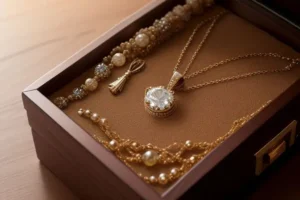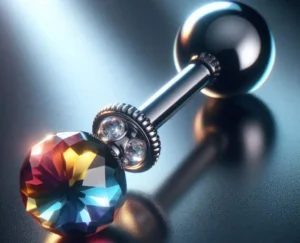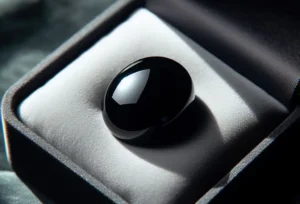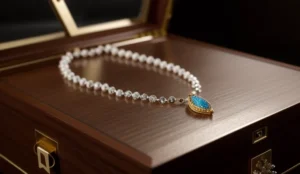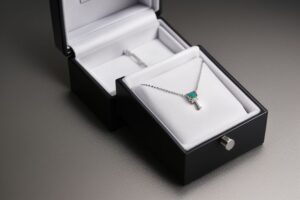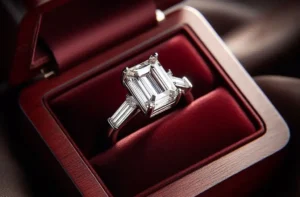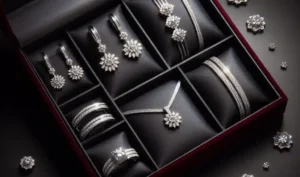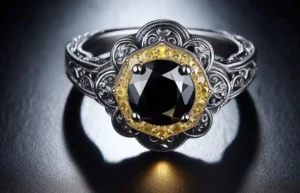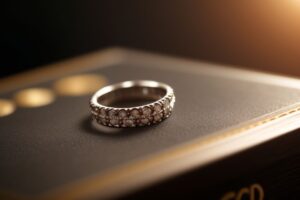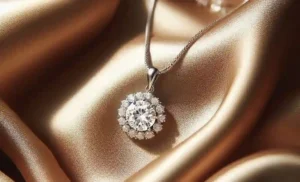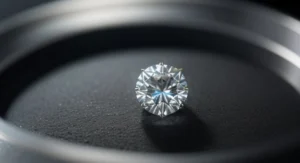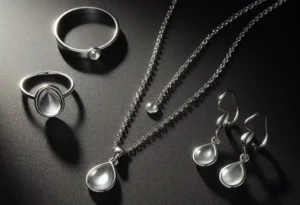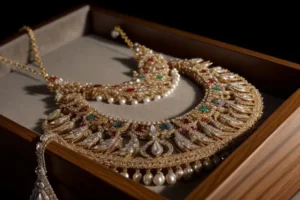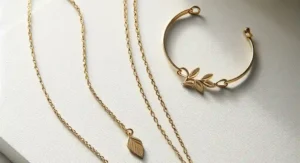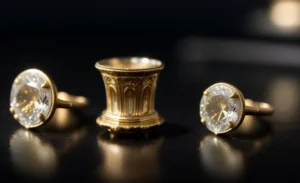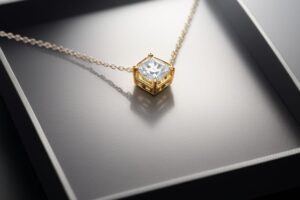Does Gold Go Off In a Metal Detector? Ah, the age-old question that has puzzled beachcombers and treasure hunters alike: does gold really set off a metal detector? It’s a query that, at first glance, might seem straightforward. After all, gold is a metal, right?
But, as we dive into this glittering topic, you’ll discover there’s more to it than meets the eye.
So, buckle up, jewelry enthusiasts and curious minds, as we embark on a journey through the fascinating world of metal detection and uncover whether your precious gold pieces can indeed play a game of hide and seek with technology.
Does Gold Go Off In a Metal Detector?

Absolutely, gold can indeed trigger an alert from a metal detector, but it’s not just a simple “yes” or “no” scenario. Metal detectors, those magical wands of the modern treasure hunter, are designed to detect various metals, including our prestigious gold, by responding to the conductivity and magnetic responsiveness of metals.
Gold, with its noble stature in the metallic world, is a good conductor of electricity. This characteristic makes it detectable by metal detectors, especially those tailored for gold hunting.
However, the detection can be influenced by several factors such as the size of the gold object, its purity, and how deeply it’s buried. Small gold pieces, or those with a lower karat value mixed with other metals, might play hard to get, making the metal detector work a bit harder to catch its tune.
So, while your metal detector is indeed capable of playing a beautiful symphony upon finding gold, ensuring it’s finely tuned to gold’s frequency is key to making that encounter more than just a chance meeting.
The Heart of the Matter: What Makes Metal Detectors Beep?
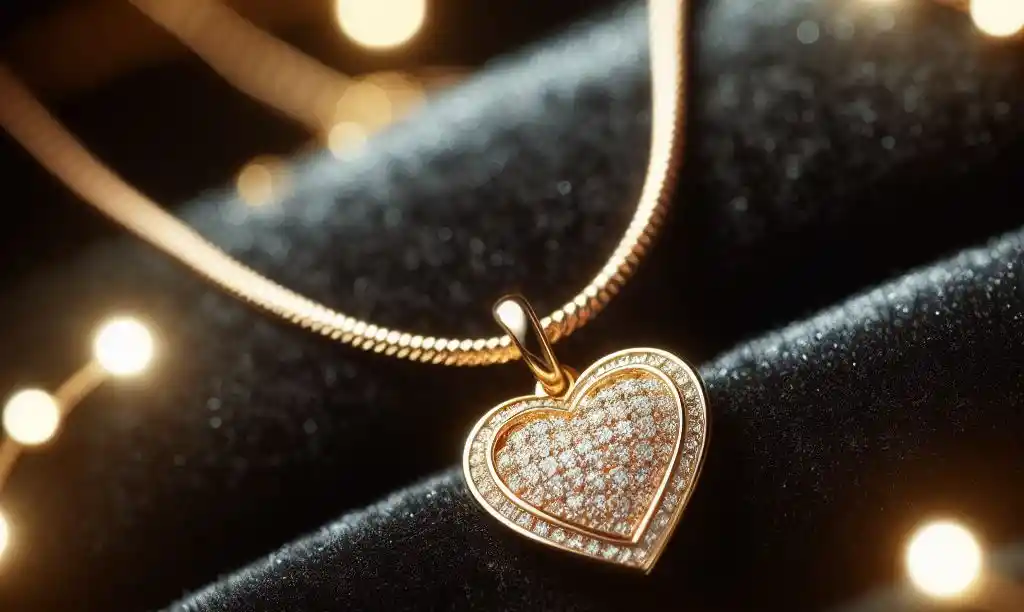
Diving headfirst into the heart of metal detection wizardry, let’s crack the code on what transforms a peaceful stroll into a beep-filled bonanza. Picture this: your metal detector, a silent hunter, sweeps the terrain, casting an invisible electromagnetic net into the unknown.
This isn’t just any old fishing expedition; it’s a high-tech quest for metallic glory. Now, when this sophisticated electromagnetic field collides with a hidden treasure, say a gold ring lost in the sands of time, something fascinating happens.
Gold, with its opulent shine and conductive swagger, distorts this electromagnetic field. It’s akin to dropping a pebble into a still pond and watching the ripples disrupt the calm.
This distortion is the detector’s cue to sing its sweet song of discovery, alerting you that something special lies beneath your feet. It’s a delicate dance between science and serendipity, where the metal’s properties and the detector’s technology are perfectly in tune.
Yet, it’s not just about whether gold can make a metal detector beep—it’s about understanding the symphony of factors that lead to that moment of discovery.
Each beep is a note in a larger melody, a hint of the mysteries lurking just below the surface, waiting for the right conductor to reveal their secrets. It’s this intricate interplay of technology and treasure that keeps the quest for gold eternally captivating.
Gold’s Relationship with Metal Detectors: It’s Complicated
Navigating the intricate dance between gold and metal detectors is akin to deciphering a complex love story. It’s not merely about if gold can make a detector beep; it’s a nuanced tale of compatibility, settings, and, dare we say, mood.
Imagine you’re at a crowded party (the beach, in this case), searching for a friend wearing a gold necklace. The room (or sand) is buzzing with noise (signals from various metals), making your quest challenging.
Here’s where the story gets interesting. Not all metal detectors serenade gold the same way. Some are like lovestruck poets, sensitive and finely tuned to whisper sweet nothings to nearly any type of gold. Others, perhaps more like distracted partygoers, may need a nudge (adjustment of settings) to notice the gold in the room.
The frequency of your detector acts as its flirtation technique—some frequencies are better suited for a deep connection with gold, while others might casually glance over it.
Moreover, gold doesn’t always come ready to mingle. Its form—be it a hefty ring or a delicate earring—along with its purity, affects its ability to catch the detector’s eye. A pure gold piece might as well be holding a “Here I am!” sign, whereas a smaller, mixed alloy item could be wallflowering in the corner, easy to overlook.
In this swirling party of detection and discovery, knowing your detector’s preferences and how to woo the gold out of its hiding places is the key to a successful treasure hunt.
Setting the Stage: The Variables That Affect Detection
Imagine stepping onto the stage, metal detector in hand, under the spotlight of anticipation. But wait, this stage isn’t just any stage—it’s layered with complexities that can either make or break your performance in the gold detection drama.
The soil you tread upon holds secrets; its composition can be the noisy crowd that drowns out the whispers of gold beneath. Highly mineralized soils, with their boisterous background noise, can easily mask the precious signals you seek, turning a potential standing ovation into a murmur of missed opportunities.
Then there’s the depth of the treasure’s burial—a critical player in this act. Like a shy performer lurking in the shadows backstage, a gold nugget buried too deep might never get its chance to shine, no matter how loudly you call for it. It’s a game of inches and sensitivity, where the detector’s reach is tested against the hiding depths of gold.
And let’s not forget the ensemble cast of other metallic objects sharing the stage. They’re like the supporting actors who can either enhance the star’s performance or steal the spotlight, confusing your detector and leading you on a wild goose chase.
This stage, with all its variables, sets the scene for a thrilling performance where only those with a keen understanding of the script—knowledge of their equipment and the environment—can hope to uncover the hidden gold that lies waiting for its cue to enter the spotlight.
High-End Bling vs. Metal Detectors: A Pricey Predicament?
Now, here’s where our treasure hunt takes a turn into the luxe lane. The pursuit of that shimmering, elusive gold with a metal detector might just have you pondering the economics of your passion. Picture this: the allure of striking gold, whether it’s a long-lost ring or a buried nugget, is tantalizing.
But then comes the reality check – the more adept a metal detector is at whispering sweet nothings to those hidden golden treasures, the heftier its price tag.
You see, those top-tier detectors, the ones with the finesse to distinguish a gold earring from a soda can pull tab, don’t come cheap. It’s a bit like choosing between a practical car and a luxury sports model – both will get you places, but the ride (and the cost) will be drastically different.
So, the question dances in the air: Is the thrill of the hunt, the potential to unearth hidden fortunes, worth the splurge on high-end detecting gear?
For the die-hard aficionado with dreams of gold-laden beaches or the professional with their eye on historical hotspots, investing in premium metal detection might not seem so daunting. Yet, for the casual enthusiast, drawn more to the adventure than the payday, it’s a dilemma worth pondering.
Balancing passion and practicality in the quest for gold is an art in itself, reminiscent of the very treasures we seek – valuable, sought after, and ever so elusive.
Practical Tips for the Jewelry Aficionado
For those who have a spark for jewelry and are intrigued by the prospect of metal detecting, armoring yourself with knowledge and strategy is key. First off, familiarize yourself with the nuances of your metal detector.
Each device has its own language of beeps and signals—learning this language will make you fluent in finding hidden treasures. Think of your detector as a trusty sidekick; the better you understand its quirks, the more successful your adventures will be.
Next up, do your homework. Gold isn’t going to wave at you from the sidelines; you need to know where to look. Historical records, old maps, and local lore can point you to areas where gold has been found before. This isn’t just about chasing ghosts; it’s about following the trails left by those who’ve tread the path before you.
Remember, Rome wasn’t built in a day, and neither is a gold hunter’s fortune. Patience is your greatest asset. There will be days filled with nothing but bottle caps and nails, but perseverance could lead to the day when your detector serenades you with the beep of gold.
Lastly, if you’re hitting the beach or a public spot, ensure your prized possessions are securely stored. It’s all fun and games until your precious ring decides to play hide and seek. Better to enjoy your hunt without the heart-stopping moments of thinking you’ve lost a personal treasure.
The Future of Gold Detection: What Lies Ahead?
Peeking into the crystal ball of gold detection technology, we’re on the cusp of a dazzling future. Imagine strapping on a metal detector that doesn’t just beep haphazardly but whispers the secrets of the earth with pinpoint precision.
The evolution in this field is not just promising—it’s like watching a sci-fi movie unfold in real life, except you’re the star holding the futuristic gadget.
In the pipeline, we have detectors that are slated to redefine the game. They’re getting smarter, learning to differentiate between a rusty nail and your next big gold find with an accuracy that would leave current models in the dust.
Think about it: less time sifting through junk, more time reveling in the glow of genuine finds. This leap forward is thanks to the wizards in tech, working tirelessly to refine the algorithms and sensitivity of these treasure hunters.
Moreover, the depth at which these modern marvels can detect is about to stretch even further. No longer will gold be able to play its best game of hide and seek. With advancements in technology, those elusive nuggets buried deeper than ever before will start to feel the heat, making the dream of unearthing something truly spectacular not just possible but probable.
In essence, the thrill of discovery is about to get a turbocharge, propelling us into a future where the only thing more exciting than the technology is the gold it helps us find.
Wrapping It Up: A Nugget of Wisdom
In closing, let’s embrace the shimmering truth that metal detectors do indeed have a soft spot for gold, a revelation as rich as the treasures we dream of finding. But, dear seekers of the golden sparkle, it’s crucial to recognize that the path to discovery is sprinkled with twists, turns, and a fair share of mystery.
Armed with knowledge, patience, and a keen sense of adventure, you’re not just a person with a gadget on a quest; you’re a modern-day explorer, navigating the delicate interplay between technology and the timeless allure of gold.
The pursuit, while punctuated by the electrifying beep of potential finds, is more than a mere chase; it’s an invitation to learn, to explore, and to connect with the world in a uniquely profound way.
Whether you’re a seasoned veteran with eyes keenly attuned to the subtlest signals or a newcomer eager to embrace the thrill of the hunt, the journey towards uncovering gold is as enriching as the treasures themselves.
Remember, every beep, every false alarm, and yes, every triumphant discovery is a step on an unparalleled adventure—a testament to the enduring fascination with what lies just beneath our feet.
So, wield your detector with pride and curiosity, for the world is brimming with secrets, and you hold the key to unveiling them. The search for gold is much more than a hobby; it’s a captivating quest that echoes the very essence of discovery and wonder.
FAQs
Q: Can all metal detectors find gold?
A: While most detectors can theoretically sense gold, not all are created equal in this noble pursuit. Some are more akin to generalists, jacks-of-all-trades but masters of none, while others are fine-tuned virtuosos, specifically designed to serenade gold out of its slumber.
Q: Does the size of gold matter for detection?
A: Absolutely! Think of gold pieces as performers on a stage; the larger they are, the louder their presence. Smaller pieces might whisper so softly that only the most sensitive of detectors can hear them.
Q: Will depth affect my quest for gold?
A: Indeed, depth is a sly character in this narrative. The deeper the gold, the harder it is for your metal detector to catch its song. This is where your device’s sensitivity and the technology it harnesses come into play.
Q: Can mineralized soil hide gold from detectors?
A: Yes, highly mineralized soil can be like a noisy crowd, drowning out the gold’s call. Advanced detectors with ground balance features are like skilled conductors, cutting through the noise to find the gold’s melody.





